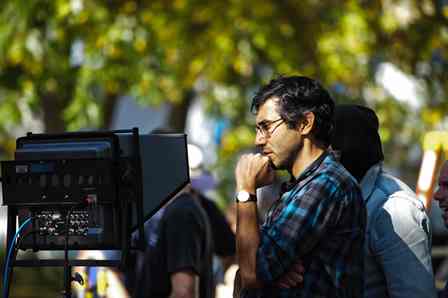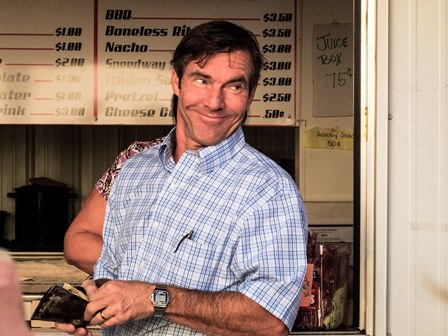CHICAGO – Patrick McDonald of HollywoodChicago.com appears on “The Morning Mess” with Dan Baker on WBGR-FM (Monroe, Wisconsin) on March 21st, 2024, reviewing the new streaming series “Manhunt” – based on the bestseller by James L. Swanson – currently streaming on Apple TV+.
Interview: Dennis Quaid, Ramin Bahrani of ‘At Any Price’
CHICAGO – Writer/director Ramin Bahrani delivers his most mainstream film this weekend with the Chicago release of “At Any Price,” an old-fashioned melodrama starring Dennis Quaid as a grain farmer caught in some awful situations in order to protect his family. The director of the fantastic “Man Push Cart,” “Chop Shop,” and “Goodbye Solo” expands his canvas to offer what often feels like a modern update on “Death of a Salesman” and the film features one of Quaid’s most charismatic and complex performances in years. Both gentlemen recently sat down with HollywoodChicago.com and eFilmCritic.com to discuss the film, how Quaid got the part, and Bahrani’s feelings on the passing of a man who influenced him greatly, Roger Ebert.
PETER SOBCZYNSKI: One of the recurring themes of “At Any Price” is the idea of “expand or die.” In the film, this is in regards to farming but how does that idea relate to you as a filmmaker as this is larger in scale and scope than your previous directorial efforts?
RAMIN BAHRANI: I thought about that, actually. In the film, “expand or die” is so much about what I think is happening in the country and in other parts of the world as well, which is this kind of capitalism on steroids. There was a time when de Tocqueville came to America and wrote about it as something amazing. He also talked about pragmatism, which is the idea that what is good for me should also be good for you but hopefully a little bit better for me because I want it to be better for me. I don’t believe in wealth equality because it doesn’t work but things are so off now that it is more like what is good for me should be bad for you, which will ultimately be bad for me and bad for the country. This idea of “expand or die” has that in it inherently—I will keep expanding until everybody dies, including me. It is also part of the struggle of modern farming, which is that if you have a 200-300 acre farm, you are considered a hobbyist farmer and if you have 2000-3000 acres, you are considered a small farmer. When Dennis has to continue to leverage things to buy bigger equipment in order to compete, eventually the only way to stay afloat is to become corrupt. It seems that is one of the only ways to survive now.

At Any Price
Photo credit: Sony Pictures Classics
In terms of me as a filmmaker, there is a pressure that a lot of other filmmakers feel in that it is just so hard to get films made. It is even harder to get a film like this made than the smaller ones because the smaller ones require a smaller budget. You have to realize that Sony Pictures Classics Classics is only releasing this film—it was independently financed and they bought it after the fact. When you go to ask people for money and you are making a drama about human beings, it is as if you told them that you hated their mother. Now add to it that you want to make a film in a rural setting. Now it is as if you killed their mother because they will tell you that overseas, audiences will not go to movies with rural settings. I said “Don’t they farm in other places in the world?” and they told me that they only want to see films with urban settings. This is the mentality of accountants and unimaginative people who have to figure out costs before making a film. Then you find heroic people like Dennis and Zac and Killer Films that believe in doing something that is actually good and about something. As a filmmaker, you have to keep dropping the budget—Dennis’ trailer becomes his car instead of a trailer—and you somehow get it done by hook or by crook. It is up to critics like you and the late, great Roger Ebert to help audiences to go to see it.
 At Any Price Photo credit: Sony Pictures Classics |
BRIAN TALLERICO: You said something interesting about how as things get bigger and bigger, it naturally leads to corruption. Do you think that is true in everything, not just farming?
BAHRANI: Basically, yes.
DENNIS QUAID: Yeah. All those cornfields out there—all that they are missing are the skyscrapers and the office buildings because that is basically what it is. The corporations are out there running the show and the whole concept of the family farm is disappearing for the most part in this country.
TALLERICO: Can you speak a little about the on-the-ground research that either of you did for film? Did you spend time in the heartland visiting farmers?
QUAID: I was already coming off another film when i came on to this one, so there wasn’t really a lot of time for research. Ramin had done so much—he really lived there with farmers, knocked on their doors and wound up sleeping in their houses. I relied on him for so much of that. We were also shooting on a farm there and they just opened up their doors and that let us soak in that family and who they were, although they weren’t like the family in this film.
SOBCZYNSKI: Were you at all familiar with Ramin’s previous work before signing on to the film?
QUAID: No, I wasn’t and that was one of the reasons I wanted to do the film. They offerd me the part and sent me his other movies, “Goodbye Solo,” “Chop Shop” and “Man Push Cart”,” and I immediately wanted to work with him. He makes films that make you feel like you are watching a documentary—they don’t preach but at the same time, there is some social relevance and significance behind his movies. He doesn’t preach but he holds a mirror up to light shows worlds that you don’t otherwise see.
 At Any Price Photo credit: Sony Pictures Classics |
BAHRANI: Well, the idea of a farm movie to most people is either Terrence Malick, who I adore, or the thing were the bank is going to foreclose and everyone is wearing overalls. I tried to play a little bit with those conventions and continued to subvert them as the movie goes forward. I think it is so much the opposite of the romantic farm film.
SOBCZYNSKI: One of the things that I thought was interesting is that you bring up early on the whole thing about genetically modified corn and instead of making the entire story revolve around that to a melodramatic degree, you instead treat it as just another fact of life in the world of modern farming.
BAHRANI: If it had been an agenda film, I would have led the two of you and an audience to stampede out of the cinema and kick the director in the head. No one wants to see an agenda film—people want to watch an engaging story about human beings that has a story and emotion in it. I hope that this film has people asking questions about the characters and the really tough decisions that this family has to make. The movie goes unexpected places and they have to make really tough choices. I think those questions that the family are making could be connected to the country as a whole.
TALLERICO: You do a quick Google search on the movie and one of the first things that comes up are comparisons to “Death of a Salesman.” Was that intentional on either of your parts – either in crafting the film or, Dennis, in your portrayal?
QUAID: It was definitely intentional. We started talking about it at the very beginning. Ramin thought about it during his writing. Just about all of the stuff we’ve been talking about – the bigger ideas of a man who has been chasing the American Dream and, in the process, corrupted himself. Henry Whipple has a veneer, a façade that is that of a salesman. It’s what he shows to the world. It’s not really who he is inside. There’s a desperation to him inside that, as the film goes along, starts to crack.
 At Any Price Photo credit: Sony Pictures Classics |
TALLERICO: Did either of you worry about making him too unlikable?
QUAID: I just put my trust in Ramin. What I was trying to do was portray a real human being as he was. The likability had to be thrown out the window. His reasons for doing what he does are based in the right place – what he’s trying to protect and where he’s trying to go in life – but he’s deluded himself in the way he goes about it. He believes his own façade.
SOBCZYNSKI: On the surface it’s the American Dream but we see the darker side as he goes on. The dark side of the American Dream.
QUAID: Right.
BAHRANI: In “Death of a Salesman,” he kills himself to achieve the dream. Arthur Miller was trying to tell us, “This character has killed himself for you. Please don’t behave that way.” I couldn’t end the film that way, partially because “Goodbye Solo” ends in a suicide. So I had to find another way to bring death and dying into the film. For Dennis’s character, how could I have a character achieving everything he wanted and yet inside of him would be haunted by his success? He would wish he didn’t have it but now it’s too late based on the circumstance. In “La Strada,” the howling on the beach at the end of the film is the realization that it’s too late now. I think a big part of that film is “don’t do that.” That kind of character is so hard to manage. We hope that some will empathize by the end. We start to see why Dennis’s character is like that. And then, in the end, we should feel the same way Dennis’s character feels – “I shouldn’t have done these things and now it’s too late.”
TALLERICO: I put up a thing on Facebook that I was coming to talk to you guys and I loved the variety of response I got for you, Dennis. “Far From Heaven,” “Innerspace,” the hilarious stuff he does on “Ellen”…
QUAID: That’s how I got the part. Really! He watched all my movies but the closer was watching me on “Ellen.”
BAHRANI: Yeah. I loved Dennis. Who doesn’t? “Breaking Away” – that’s no joke. One of the most important American films of that decade. But when his agent called me and said he wanted me to think about Dennis, the first thing you do is type “Dennis Quaid” into the internet and those “Ellen” clips pop up. I felt I had a glimpse of who Dennis might be as a person and I thought I’d like to be with this guy for a few months in the heartland. And then you go and you rent some of the movies that you love and watch them again and see if you can imagine them in the part.
TALLERICO: The wide variety of your resume was what jumped out at me and I wondered how intentional that diversity was in your decision making. Do you think variety in long term or do you take every role as they’re offered?
 At Any Price Photo credit: Sony Pictures Classics |
QUAID: Well, that has been the only strategy for me in my career – try to do as many different types of genres and characters. It keeps the fire in my belly about acting. I always kind of know that I should do something if there’s a fear factor involved. How do I get there? Sometimes it’s successful, sometimes not. I started out in theater. I was always interested in character. I cut my teeth on the movies of the ‘70s, which was the era of character leading men.
SOBCZYNSKI: You’re doing TV now with “Vegas.” I’m curious about the shifting of the process with doing a character for as long as you have to on TV versus film.
QUAID: It’s a very different process. I had been looking for something to do in TV because of the way movies in general have become. A lot of actors are going to television. Nick Pileggi, the guy behind “Casino” and “GoodFellas,” and a true story – I thought I’d be able to tell a story over a long period of time and have a character transform and, hopefully, I’ll get a chance to do that.
TALLERICO: I do a radio show every Saturday and we get “Vegas” calls every other week. I just wanted you to know you have a diehard fan base there. You’ve got that, this movie, 3 or 4 more in the can, do you ever consider taking a break? Do you get exhausted?
QUAID: I’m exhausted right now. (Laughs.) We just finished “Vegas” and now three weeks of press tour for this. I like working a lot. I get attracted to certain things. One of the things that I liked about “Vegas” was being home in L.A. and sleeping in my own bed at night. Everybody works for a living. You guys work 50 weeks of the year. (Laughs.) Even if I do three films, it adds up to about six months.
 At Any Price Photo credit: Sony Pictures Classics |
TALLERICO: We’re getting wrapped up soon and I’d like to hear your thoughts on the recent passing of Roger Ebert. Either or both of you.
QUAID: I’ll let Ramin speak to Roger since he has a personal relationship.
BAHRANI: It was a big loss. I was to see him this morning. We emailed the day before he passed. I had come to see him on Xmas day and spent the morning with Chaz. There are so many things I could say that we know. Like you, I’m sure, I came to know there was such a thing as film criticism by watching his shows as a kid. And then that leads you to his written work and this guy knew how to WRITE. He knew how to write about the most complex film in the most simple, imaginative, and incisive way so that anyone could understand and yet he was always deeper than anyone else. There was no phony intellectualism. He always got to the heart of it. And he helped elevate cinema in people’s minds so that it could be something worth talking about. That we can sit here in this room and talk about cinema but without it being pretentious. That’s really, really hard to do. Personally, he gives me courage. I worked so hard to make “Goodbye Solo” but unless it’s “X-Men 7,” it gets so hard to watch them. How do you get them out there? And I would think, “How do I keep going?” Because Roger is there and other critics who get other people to watch them. I have courage because of that and some sense of drive that I have to keep making better films to live up to what he has said about me personally. I have to make him proud in some way. His standards are so high.
“At Any Price” is now playing in some markets and opens Friday, May 3, 2013 in Chicago.
 | By BRIAN TALLERICO |


